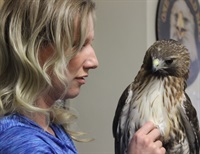
The Cape Fear Raptor Center is dedicated to compassionate and aggressive rehabilitation services to injured raptors with the goal of releasing their charges into their natural habitat. The center conducts educational programs regarding the importance of raptors in our ecosystem.
“We currently have 35 raptors under our care,” said Fay Russell, a volunteer at the raptor center. “We have five raptors offsite.”
The injured raptors can be moody patients. Miss Granny Fay talks to them and they respond to their “granny” as the raptors are weighed, treated, and fed.
“We document all of our care,” said Miss Fay. “We see all types of injuries – some come in with poisoning or hunter’s traps; some are shot. We work closely with the NC Wildlife Commission and the game warden if poaching is suspected.”
The Cape Fear Raptor Center started in 2011 when Dr. Joni Seymour, the veterinarian at the Rocky Point Animal Hospital was contacted a baby owl.
“Archie,” said Dr. Joni, as the great horned owl snuggles her neck.
Archie was found on Gordon Road by a dog. Archie was so young, his eyes hadn’t opened yet. The dog never hurt Archie, but carried the owl in his mouth for a couple of days. The dog’s owner learned it is illegal to own a raptor or even have the feather of a raptor. So they reached out to Dr. Joni, who was also a falconer.
“A baby bird will imprint the first face it sees,” said Miss Fay.
Archie is now an “ed bird” used in the education programs of the Cape Fear Raptor Center.
“Next was Opey,” said Miss Fay. “Opey was injured and lost an eye.”
Each raptor has its own personality. Opey has built a nest and he croaks like a duck.
“These birds are important to our ecosystem,” said Miss Fay. “Whatever they eat – mice, rodents, squirrels, rabbits – they control the population. It’s important to keep them out there.”
“If we don’t protect them, we’re not protecting our ecosystem,” said Dr. Joni. “They are biological indicators. They suffer when we impact our environment through deforestation and pollution.”
While caring for injured raptors, the Cape Fear Raptor Center offers raptor educational programs at their private facility. These educational programs are perfect for children ages 10 and older. The program gives participants the opportunity to see raptors up close. They see endangered raptors from barn owls to eagles.
In reach-out educational programs, a team of volunteers take a few raptors to special events and another team visits schools.
“Our goals include getting people here, donate, and someday - perhaps in 5-to- 8 years - have a free standing educational center. But we need to secure land and build a building that will be open to the public,” said Dr. Joni.
“We need more volunteers,” added Miss Fay. “We invite veterans and retirees to volunteer.”
Miss Fay said volunteers do not need to work at the center every day. She said they are flexible with schedules.
For more information about the Cape Fear Raptor Center, visit their website at www.capefearraptorcenter.org. To volunteer or to donate, stop by the center at 9185 US Hwy 117 in Rocky Point. The telephone number is 910-687-6888.




